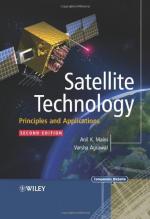|
This section contains 1,194 words (approx. 4 pages at 300 words per page) |

|
The world changed on October 4, 1957, when the Soviet Union launched the Earth's first artificial satellite (the Moon is a natural satellite). Sputnik, a Russian word meaning "fellow traveler," was an 83 kilogram (183-pound) satellite the size and shape of a basketball. It did little except orbit the Earth every 98 minutes and emit a simple radio signal, a recording of which can be downloaded from a National Aeronautics and Space Administration (NASA) web site (http://www.hq.nasa.gov/office/pao/Hist ory/sputnik/). Yet, this simple event started what was to be known as "The Space Race" that eventually led to the lunar landings as well as space shuttle missions, and weather and direct broadcast television satellites.
Although the satellite concept is theoretically simple—an object placed high enough above Earth's atmosphere to be moving at a speed of eight km/sec (17,280 miles/hour)—the...
|
This section contains 1,194 words (approx. 4 pages at 300 words per page) |

|



